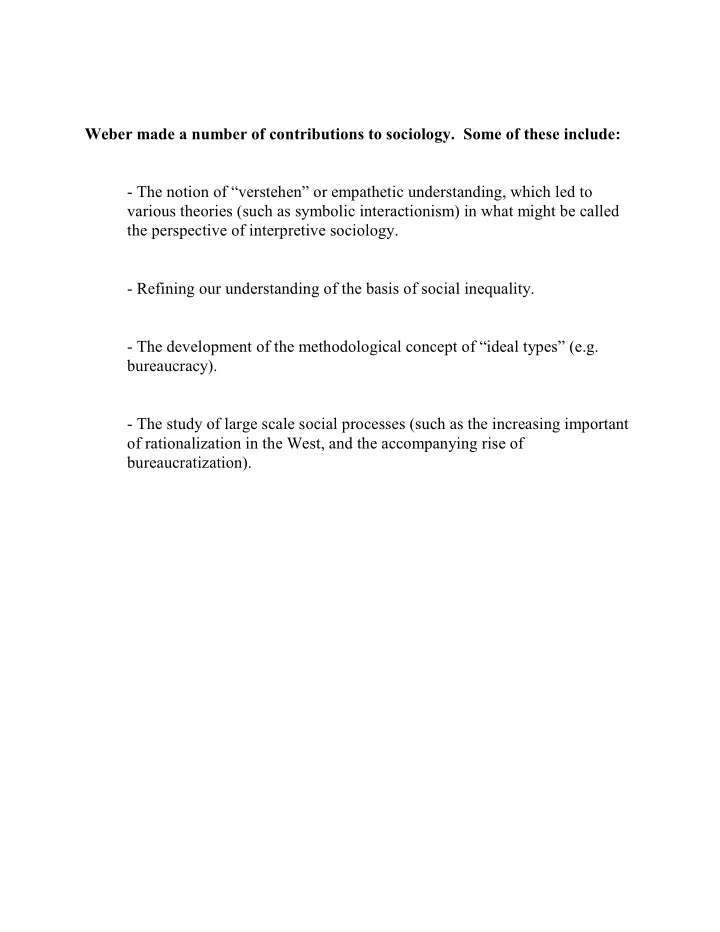

Weber made a number of contributions to sociology. Some of these include: - The notion of “verstehen” or empathetic understanding, which led to various theories (such as symbolic interactionism) in what might be called the perspective of interpretive sociology. - Refining our understanding of the basis of social inequality. - The development of the methodological concept of “ideal types” (e.g. bureaucracy). - The study of large scale social processes (such as the increasing important of rationalization in the West, and the accompanying rise of bureaucratization).
Weber’s Definition of Sociology: Weber defined sociology as "that science which aims at the interpretive understanding of social behavior in order to gain an explanation of its causes, its courses, and its effects. VERSTEHEN refers to the attempt to comprehend social action through ! empathetic understanding of the actor by the observer.
RATIONALIZATION Rationalization was composed of a number of aspects; in particular an ! emphasis on EFFICIENCY, CALCULABILITY, AND DEMYSTIFICATION. In addition, it has been argued that these lead to DEHUMANIZATION. EFFICIENCY refers to doing something in the quickest and most direct ! way. CALCULABILITY means an emphasis in predictability and quantification. ! DEMYSTIFICATION refers to a process whereby magical elements are ! eliminated from a society and replaced with more logical components. DEHUMANIZATION means, that as we focus on the process of ! rationalization (efficiency, calculability, and demystification) we overlook the impact of such policies on people.
Weber, in refining Marx's categories of class, states: We may speak of a class, when (1) a number of people have in common a specific causal component of their life-chances, insofar as (2) this component is represented exclusively by economic interests in the possession of goods and opportunities for income, and (3) is represented under the conditions of the commodity or labor markets. Classification of people into such groups is based on their consumption patterns rather than on their place in the market or in the process of production
For Weber the main social classes were: 1. the working class as a whole - the more so, the more automated the work process becomes; 2. the petty bourgeoisie; 3. the propertyless intelligentsia and specialists (technicians, various kinds of white collar employees, civil servants - possibly with considerable social differences depending on the cost of their training); 4. the classes privileged through property and education.
Weber was concerned with analytically separating "class" from status group. ! Class is power in the market place. ! Status groups, are communities of people who are defined as belong to the ! same social group on the basis of their ideas about proper life-styles and by the social esteem and honour bestowed upon them by others. Status groups involve exclusiveness of membership; awareness of similar ! tastes, life style, and interests; and a tendency to act and interact as a group. Prestige is associated with the style of life of a status group. ! Status is a personal evaluation people make of one another. ! Within any given class, one may find several status groups ! Additionally, a member of a specific status group is bound by expectations ! of restrictions on social intercourse with those not belonging to the circle, and is supposed to display social distance towards inferiors.
Weber also discussed PARTY; which referred to the political sphere and ! political involvement, as an additional basis of power and of command over resources in society. WEBER conceived of POWER, as the chance of one, or a number of ! individuals, "to realize their own will in communal action, even against the resistance of others."
In sum, Weber's contributions include the following: - He pointed to the importance of "social definitions of reality". - He emphasized non-economic status (and associated lifestyles) as an important dimension of social stratification. - He developed a model of bureaucracy. - He emphasized that there are a variety of bases for power. Within Environmental Sociology: - Weber’s ideas about “verstehen” have indirectly led to the development of the “social construction” perspective. - Some of Weber’s insights about status competition and their role in social inequality are relevant to understanding “consumerism”. - Weber’s insights about the nature of rationalization and bureaucracy have been applied to the study of organizations.
Recommend
More recommend